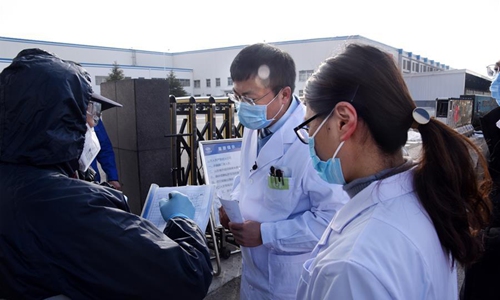HOME >> CHINA
Grassroots govt workers accused of overacting amid virus outbreak
By Xu Keyue and Wan Lin Source:Global Times Published: 2020/2/19 0:40:39

A medical service team check a record of workers' body temperature at the base of auto maker SGMW in Qingdao, east China's Shandong Province, Feb. 17, 2020. To ensure the normal production of enterprises after resuming work, Xihai'an (West Coast) New Area of Qingdao has set up medical service teams to serve enterprises. The first batch of 279 medical personnel of 50 medical service teams were stationed in key enterprises to assist in the epidemic prevention and control. (Xinhua/Li Ziheng)
Series of acts by grassroots workers in epidemic prevention and control, including tying up a villager who refused to wear a mask to a pillar and slapping people for playing mahjong, have been criticized by netizens and provoked public backlash for abuse of power.
A video circulated on social media showing a worker wearing a white protective suit and medical mask in Mengke village, Central China's Henan Province, yelling at a man who didn't wear a mask and was tied by another worker to a pillar.
"Do you want to survive [the viral outbreak]? If you don't, other residents still do!" says the worker in white, the video shows.
Many netizens criticized the workers' overreaction, saying tying up people goes too far, and the workers can persuade residents to wear masks or call the police to detain people if they break laws or regulations but cannot tie up others.
Some also condemned the villager as he refused to follow regulations to wear a mask in the first place to protect himself and others amid the viral outbreak even after repeated persuasion.
Challenged by public criticism, the department in charge of the COVID-19 prevention and control at the village published an announcement on Monday saying the inappropriate conduct and aggressive behavior were done by the workers upon criticizing and educating a villager surnamed Jing, who did not wear a face mask when he entered the epidemic examination point on several occasions and refused to heed their advice.
The department said that they criticized the workers severely and educated them regarding the incident, and subsequently ordered them to reflect deeply on themselves and their actions.
The local public security organ has started an investigation on the matter, according to the announcement.
Similar cases have happened in other parts of China when grassroots workers acted in an excessive manner to stop social activities amid the virus prevention effort, which also triggered public suspicion.
Video clips circulating online recently showed several volunteers participating in epidemic prevention and control work breaking into a house where a family of three played mahjong. The volunteers began to throw mahjong tiles around and order the family to stop playing which led to a physical confrontation.
The clip showed a volunteer slapping the family's son and other volunteers smashing the mahjong table.
A local villager in Xiaochang county, in Central China's Hubei Province, epicenter of the coronavirus outbreak, told the Global Times the clip was authentic saying it happened on Thursday.
The government of Xiaochang announced at its website on Tuesday evening that the incident showed that some staff workers behaved inappropriately on epidemic prevention and control. The government has criticized and educated the workers, the local township head twice visited the house to apologize, and the family have expressed understanding after judicial mediation.
Another video featuring a police officer parading nine people on a street and ordering them to repeat epidemic prevention and control regulations as they played cards together also triggered widespread controversy.
Some volunteers and grassroots level workers who have abused their power, and they have no right to use violence and even cause harm when criticizing residents who broke epidemic control regulations, a grassroot official surnamed Wang in Shangrao, East China's Jiangxi Province, who joined the campaign to fight the epidemic on the second day of the Lunar New Year (January 26), told the Global Times on Tuesday.
Wang noted that although sometimes work on the grassroots level is difficult to carry out when local residents refuse to cooperate and even rebel, local workers should still treat them properly, through repeated persuasion and education, and seeking help from the public security organs.
The grassroots workers should deal with cases violating regulations or harming public safety in accordance with laws, Wang noted.
Posted in: SOCIETY